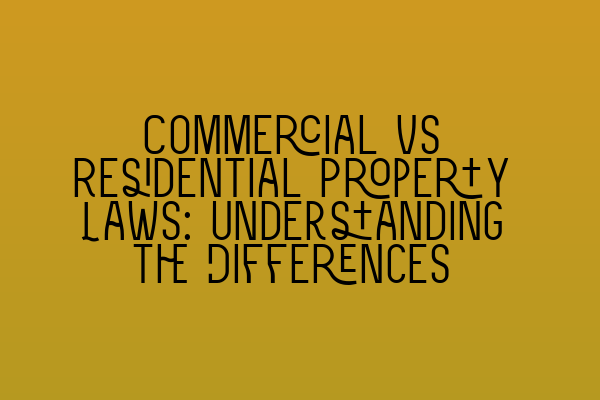Commercial vs Residential Property Laws: Understanding the Differences
When it comes to property law, the distinction between commercial and residential properties is significant. Each category has its own set of laws and regulations that govern how they can be bought, sold, leased, and managed. Whether you are a property owner, investor, or simply someone interested in these areas of law, understanding the differences between commercial and residential property laws is crucial. In this article, we will delve into the variances between the two and explore why it is important to have a solid understanding of the legal framework surrounding these properties.
Commercial Property Laws:
Commercial properties refer to buildings or land that are primarily used for business purposes. This can include office buildings, shopping malls, warehouses, industrial parks, and retail stores, among others. The laws governing commercial properties are focused on facilitating business activities and protecting the rights and interests of commercial property owners and tenants.
One key distinction in commercial property law is the way leases are structured. Commercial leases tend to be more complex and longer-term compared to residential leases. They often involve detailed negotiations and provisions related to rental rates, lease duration, maintenance responsibilities, insurance, and more. It is essential to consult a property law expert to ensure that the lease agreements adhere to legal requirements and protect the interests of both parties involved.
From a legal perspective, commercial properties are subject to zoning laws and regulations. Zoning laws dictate how the property can be used based on its assigned zoning category. These categories specify whether the property can be used for retail, industrial, office, or mixed-use purposes. It is crucial to understand zoning laws before purchasing or developing a commercial property to ensure compliance and avoid future legal complications.
Additionally, commercial property laws take into account various legal aspects related to business operations. These may include licensing requirements, health and safety regulations, accessibility requirements, and compliance with environmental laws. Understanding and abiding by these legal obligations is critical for property owners and tenants to avoid potential fines, penalties, or legal disputes.
Residential Property Laws:
Residential properties, on the other hand, are primarily designed for individuals and families to reside in. They include single-family homes, apartment complexes, condominiums, and townhouses. The laws governing residential properties focus on protecting the rights of tenants, ensuring housing standards, and promoting safe and habitable living conditions.
One key aspect of residential property laws is the relationship between landlords and tenants. Residential leases typically involve shorter-term agreements, often ranging from month-to-month to a few years. These leases must comply with local rental regulations and fair housing laws to ensure that tenants are not discriminated against and are provided with proper notice and protection.
Residential properties are also subject to building codes and regulations to ensure the safety and habitability of the premises. These regulations cover aspects such as structural integrity, electrical and plumbing systems, fire safety measures, and accessibility requirements. It is important for landlords and property managers to understand and comply with these regulations to avoid legal liabilities and protect the wellbeing of their tenants.
In addition, residential property laws provide protections for tenants against unfair eviction, deposit disputes, and substandard living conditions. These laws vary from jurisdiction to jurisdiction, so it is crucial to be familiar with the specific regulations governing the area where the property is located.
Conclusion:
Understanding the differences between commercial and residential property laws is essential for property owners, tenants, investors, and legal professionals alike. The legal framework surrounding these types of properties is complex and encompasses a wide range of regulations and obligations. By having a solid grasp of the distinct legal requirements and rights associated with commercial and residential properties, individuals can make informed decisions, mitigate risks, and ensure compliance with the law.
If you are looking to expand your knowledge in property law or prepare for the SQE exams, consider checking out our related articles and resources:
1. SQE 1 Practice Exam Questions
2. SQE 1 Practice Mocks FLK1 FLK2
3. SQE 2 Preparation Courses
4. SQE 1 Preparation Courses
5. SRA SQE Exam Dates
By staying informed, continuously learning, and seeking professional advice when needed, you can navigate the complex world of commercial and residential property laws with confidence.
